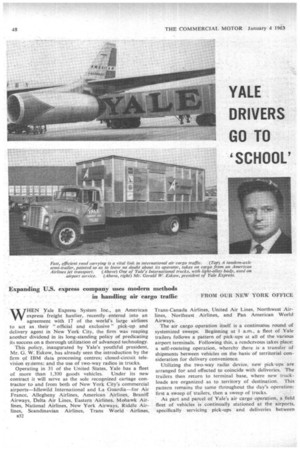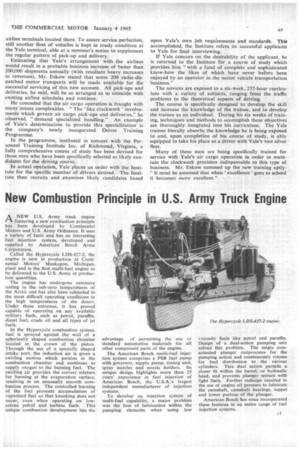YALE DRIVERS GO TO 'SCHOOL'
Page 50

Page 51

If you've noticed an error in this article please click here to report it so we can fix it.
Expanding U.S. express company uses modern methods in handling air cargo traffic
FROM OUR NEW YORK OFFICE
WHEN Yale Express • System Inc., an American express freight haulier, recently entered into an agreement with 17 of the world's large airlines to act as their "official and exclusive" pick-up and delivery agent in New York City, the firm was reaping another dividend in its long-standing policy of predicating its success on a thorough utilization of advanced technology.
This policy, inaugurated by Yale's youthful president, Mr. G. W:Eskow, has already seen the introduction by the firm of IBM data processing centres; closed-circuit television systems; and the use of two-way radios in trucks.
Operating in 31 of the United States, Yale has a fleet
of more than 1,300 goods vehicles. Under its new contract it will serve as the sole recognized cartage contractor to and from both of New York City's commercial airports—Idlewild International and La Guardia—for. Air France, Allegheny Airlines, American Airlines, Braniff Airways, Delta Air Lines, Eastern Airlines, Mohawk Airlines, National Airlines, New York Airways, Riddle Airlines, Scandinavian Airlines, Trans World Airlines,
B32 Trans-Canada Airlines, United Air Lines, Northwest Airlines, Northeast Airlines, and Pan American World Airways. • • The air cargo operation itself is a continuous round of systemized sweeps. Beginning at 1 a.m., a fleet of Yale trailers follows a pattern of pick-ups at all of the various airport terminals. Following this, a rendezvous takes place: a self-routeing operation, whereby there is a transfer of shipments between vehicles on the basis of territorial consideration for delivery convenience.
Utilizing the two-way radio device, new pick-ups are arranged for and effected to coincide with deliveries. The trailers then return to terminal base, where new truckloads are organized as to territory of destination. This pattern remains the same throughout the day's operation: first a sweep cif "trailers, then a sweep of trucks.
As part and parcel of Yale's air cargo operation, a .field fleet of vehicles is continually stationed at the airports, specifically servicing pick-ups and deliveries between
airline terminals located there. To assure service perfection, still another fleet of vehicles is kept in ready condition at the Yale terminal, able at a moment's notice to supplement the regular pattern of pick-up and delivery.
Estimating that Yale's arrangement with the airlines would result in a probable business increase of better than 200,000 shipments annually (with resultant heavy increases in revenues), Mr. .Eskow stated that some 200 radio-dispatched motor transports will be made available for the successful servicing of this new account. All pick-ups and deliveries, he said, will be so arranged as to coincide with existing airline schedules and routines.
He conceded that the air cargo operation is fraught with many innate complexities. "The 'like clockwork' involvements which govern air cargo pick-ups and deliveries," he observed, "demand specialized handling." An example of Yale's determination to provide this specialization is the company's newly inaugurated Driver Training Programme.
In the programme, instituted in concert with the Personnel Training Institute Inc. of Richmond, Virginia, a fully comprehensive course of study has been devised for those men who have been specifically selected as likely candidates for the driving course.
In actual operation, Yale places an order with the Institute for the specific number of drivers desired. The Institute then recruits and examines likely candidates based upon Yale's own job requirements and standards. This accomplished, the Institute refers its successful applicants to Yale for final interviewing.
If Yale concurs on the desirability of the applicant, he is returned to the Institute for a course of study which provides him "with a fund of complete and sophisticated know-how the likes of which have never before been enjoyed by an operator in the motor vehicle transportation business."
• The novices are exposed to a six-week, 257-hour curriculum with a variety of subjects, ranging from the traffic problems to the theoretical aspects of driving.
The course is specifically designed to develop the skill and increase the knowledge of the trainee, and to develop the trainee as an individual. During his six weeks of training, techniques and methods to accomplish these objectives are thoroughly integrated into his curriculum. The Yale trainee literally absorbs the knowledge he is being exposed to and, upon completion of his course of study, is ably equipped to take his place as a driver with Yale's vast silver fleet.
Many of these men are being specifically trained for service with Yale's air cargo operation in order to maintain the clockwork precision indispensable to this type of business. Mr. Eskow summed up the new training aptly: "it must be assumed that when ' excellence ' goes to school it becomes more excellent."








































































































